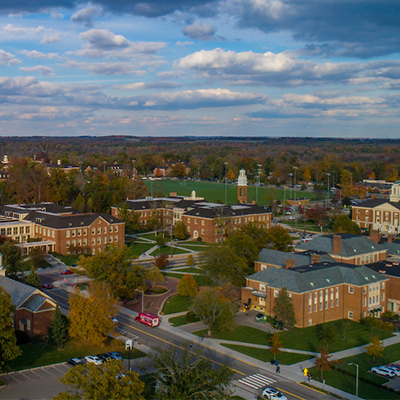Classroom Accommodations

The Miller Center for Student Disability Services
304 Shriver Center701 E. Spring St.
Oxford, OH 45056 sds@MiamiOH.edu 513-529-1541
Lecture, small group discussion and lab practicals are just a few examples of teaching methods used in the classroom. There are a variety of accommodations that can be implemented to ensure equal access in the classroom setting. Examples include preferential seating, audiotaping course lecture and advance access to presentation slides.
Students determine classroom accommodations in collaboration with Student Disability Services staff during their Access Consultation.
Students with a disability-related need for flexibility in attendance should consult with Student Disability Services (SDS). Attendance accommodations can be arranged when reasonable and appropriate. Students who are eligible for attendance accommodations should communicate with faculty regarding their needs and report absences in advance, or as soon as possible thereafter.
Braille is a system of raised dots arranged in cells. The number and position of the raised dots represents a letter, word, number, or symbol. Braille for reading and writing for Language Arts is referred to as literary braille.
Tactile graphics are a means of conveying non-textual information to people who are blind or visually impaired, and may include tactile representations of pictures, maps, graphs, diagrams, and other images. A person with a visual impairment can feel these raised lines and surfaces in order to obtain the same information that people who are sighted get through looking at pictures or other visual images.
Miami utilizes on campus braille embossers and tactile image creation as well as third party vendors to provide accessible course materials.
Notetaking accommodations are available to ensure equal access to in-class information. Our office works closely with students to help determine the best notetaking solution. We encourage you to contact us for more information.
Audio recording enables students to record course lectures, in addition to taking their own notes. Many students use a handheld digital recorder or a voice recorder mobile app on their personal device. Students use the recorded audio to review lecture content and can also use this information when working in study groups or tutoring sessions.
Students can use their laptop to take notes instead of handwriting. This can be useful for students who have needs related to dexterity, motor skills, learning or attention capabilities.
The Livescribe Smartpen enable students to record everything said and written, while linking the audio recording to the written notes. Students can replay audio from their Livescribe paper, a computer, or a mobile device with a simple tap on their handwritten notes. SDS loans Smartpens to eligible students as an accommodation. Please contact our office to learn more.
There are a variety of notetaking applications designed to improve the accuracy and organization of notes. Students use a variety of notetaking application solutions such as Notability, OneNote, or Evernote.
This accommodation utilizes volunteer peer notetakers. The notetakers are enrolled in the same course as affiliated SDS students and shares copies of class notes. This accommodation can be discussed with SDS upon request.

501 E. High Street
Oxford, OH 45056
1601 University Blvd.
Hamilton, OH 45011
4200 N. University Blvd.
Middletown, OH 45042
7847 VOA Park Dr.
(Corner of VOA Park Dr. and Cox Rd.)
West Chester, OH 45069
Chateau de Differdange
1, Impasse du Chateau, L-4524 Differdange
Grand Duchy of Luxembourg
217-222 MacMillan Hall
501 E. Spring St.
Oxford, OH 45056, USA
Mosler Hall 316
1601 University Blvd.
Hamilton, OH 45011